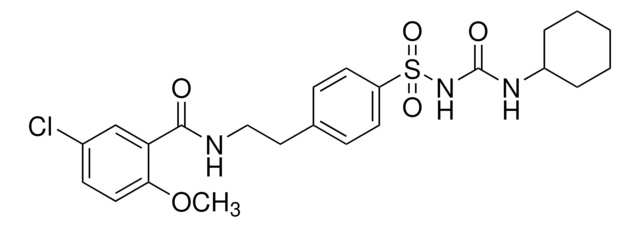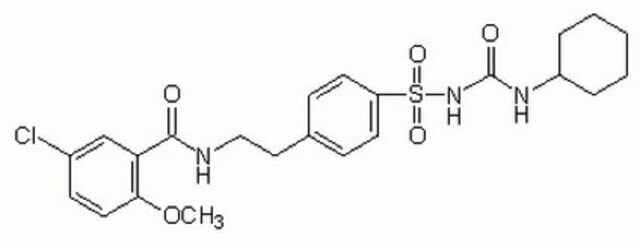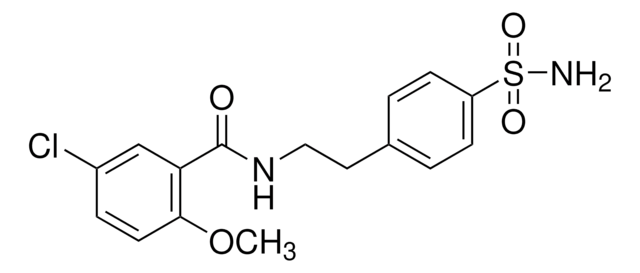G0639
Glybenclamide
≥99% (HPLC)
Sinónimos:
5-Chloro-N-[4-(cyclohexylureidosulfonyl)phenethyl]-2-methoxybenzamide, Glyburide, N-p-[2-(5-Chloro-2-methoxybenzamido)ethyl]benzenesulfonyl-N′-cyclohexylurea
About This Item
Productos recomendados
assay
≥99% (HPLC)
solubility
ethanol: 2 mg/mL
DMSO: soluble
H2O: insoluble
originator
Roche
storage temp.
2-8°C
SMILES string
COc1ccc(Cl)cc1C(=O)NCCc2ccc(cc2)S(=O)(=O)NC(=O)NC3CCCCC3
InChI
1S/C23H28ClN3O5S/c1-32-21-12-9-17(24)15-20(21)22(28)25-14-13-16-7-10-19(11-8-16)33(30,31)27-23(29)26-18-5-3-2-4-6-18/h7-12,15,18H,2-6,13-14H2,1H3,(H,25,28)(H2,26,27,29)
InChI key
ZNNLBTZKUZBEKO-UHFFFAOYSA-N
Gene Information
human ... ABCC8(6833) , KCNH2(3757) , KCNJ1(3758) , KCNJ11(3767)
rat ... Kcnj1(24521)
¿Está buscando productos similares? Visita Guía de comparación de productos
Application
- as a positive control oral hypoglycemic drug to study the hypoglycemic effects of Chlorella in streptozotocin-induced diabetic mice
- as a K+ATP channel antagonist in canine with induced acute hypoxia
- as an inhibitor of cystic fibrosis transmembrane conductance regulator (CFTR) channel in fetal distal lung epithelial (FDLE) cells
Biochem/physiol Actions
Features and Benefits
hcodes
pcodes
Hazard Classifications
Aquatic Chronic 4
Storage Class
11 - Combustible Solids
wgk_germany
WGK 2
flash_point_f
Not applicable
flash_point_c
Not applicable
ppe
Eyeshields, Gloves, type N95 (US)
Certificados de análisis (COA)
Busque Certificados de análisis (COA) introduciendo el número de lote del producto. Los números de lote se encuentran en la etiqueta del producto después de las palabras «Lot» o «Batch»
¿Ya tiene este producto?
Encuentre la documentación para los productos que ha comprado recientemente en la Biblioteca de documentos.
Los clientes también vieron
Artículos
Discover Bioactive Small Molecules for ADME/Tox
Discover Bioactive Small Molecules for ADME/Tox
Discover Bioactive Small Molecules for ADME/Tox
Discover Bioactive Small Molecules for ADME/Tox
Nuestro equipo de científicos tiene experiencia en todas las áreas de investigación: Ciencias de la vida, Ciencia de los materiales, Síntesis química, Cromatografía, Analítica y muchas otras.
Póngase en contacto con el Servicio técnico













![1H-[1,2,4]Oxadiazolo[4,3-a]quinoxalin-1-one powder](/deepweb/assets/sigmaaldrich/product/structures/764/715/605dc5a5-0864-471b-a71e-bd2aa6553c1d/640/605dc5a5-0864-471b-a71e-bd2aa6553c1d.png)
